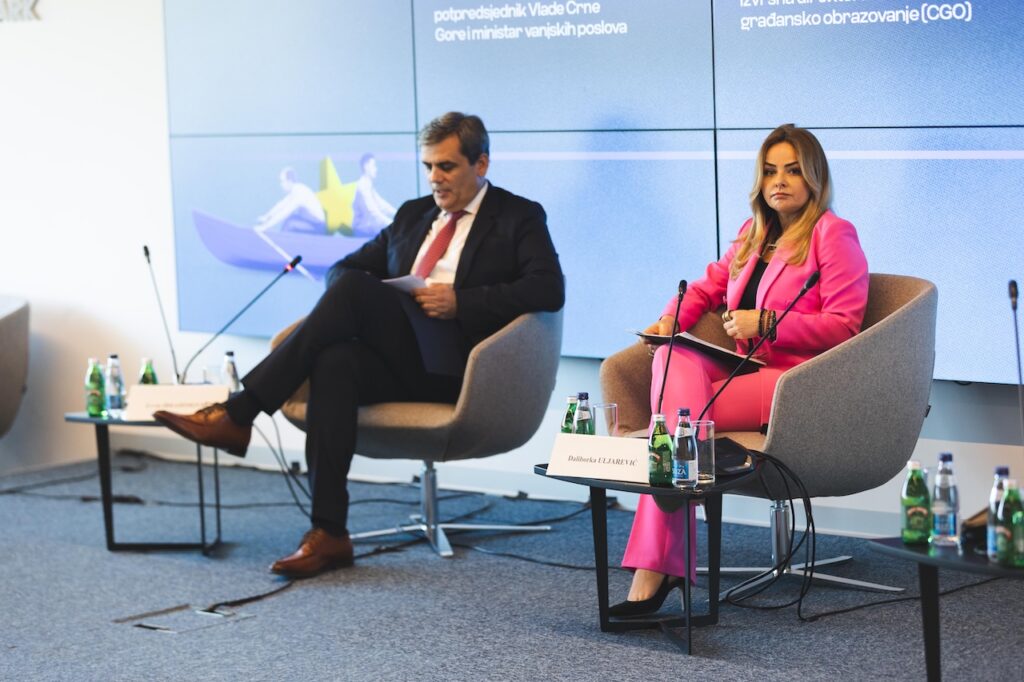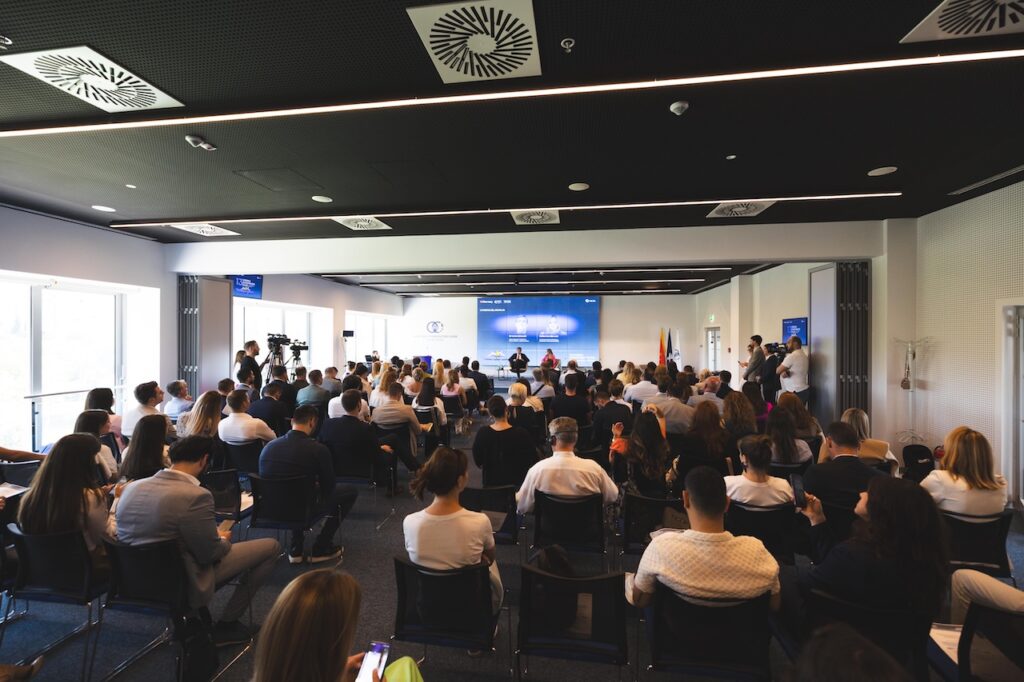Montenegro’s European path is stagnating primarily due to internal circumstances, as it stumbles over missed opportunities, abuse of institutions, and violations of the law, stated Daliborka Uljarević, Executive Director of the Centre for Civic Education (CCE), at the conference “13 Years on the European Path: Directions, Crossroads, and Detours”, organized by the CCE. At the same time, the Deputy Prime Minister and Minister of Foreign Affairs, opening the conference, underlined that Montenegro’s European future has no alternative.
Uljarević said that although Montenegro’s European path is formally structured, it has not been linear and has been marked by crossroads offering opportunities, but also detours resulting from a failure to understand this is not a technical exercise but a process of deep social transformation requiring vision, determination, and political will.
“Montenegro’s EU path is stagnating primarily because of internal circumstances, stumbling over missed opportunities, institutional abuse, and violations of the law,” Uljarević stressed, noting the lack of strategic direction and the frequent resort to improvisation and neglect of obligations, especially under Chapters 23 and 24. “We have stood at Europe’s door many times, but instead of opening it through reforms and accountability, we have tried to force it with party calculations,” she reminded.
Uljarević emphasized the need to constantly remind that the EU is not just an economic union but a community of values. “Democracy, rule of law, respect for human rights, secularism, tolerance, and anti-fascism are its foundation. This is not understood by those who affirm regressive tendencies and ideologically driven historical revisionism in an attempt to relativize crimes, equate anti-fascists and collaborators, and undermine the achievements on which modern Europe is built,” she explained, adding that the Ukrainian people defend not just their territorial integrity but also European ideals of freedom, dignity, and sovereignty.
She also recalled that the recently adopted European Parliament Resolution expressed concern over political revisionism, which distorts historical and even judicially established facts, deepens divisions, and undermines accountability. “European institutions condemn the glorification of war criminals and denial of international verdicts. In Montenegro, we are still fighting to explain that Radovan Karadžić is a war criminal and does not deserve any awards or praise,” Uljarević pointed out.
According to her, Montenegro still records the highest level of citizen support for EU membership among countries in the region, and its citizens are not seeking Europe because of bureaucracy, but because of dignity, order, and equal opportunity. “Their voice – along with the voice of critically oriented civil society – remains the most authentic European signal in Montenegro. The authorities must hear and respect this signal if they have learned anything from the fate of their predecessors who fell when they alienated themselves from the citizens and civil society,” she said.
At the CCE, as she noted, they believe it is high time to change the paradigm of political action. “This includes abandoning the partitocratic and clientelist model and establishing a framework in which institutions are strengthened, laws respected, and human rights protected without calculations. Our common task is to ensure that the European perspective does not become hostage to party strategies, distorted historical narratives, or populist rhetoric without value-based grounding,” Uljarević explained.
“In 13 years, one could complete both primary and secondary education, or secondary school and university with a PhD – yet we have not even passed the first semester, with only seven out of 33 chapters, or 20% provisionally closed,” Uljarević said in reference to the length of negotiations.
She warned that accession to the EU is not possible while simultaneously moving away from civic values and ignoring – or worse, hoping to silence – those who critically reflect and point out weaknesses in the process and in the way politics and institutions are conducted.
“I would conclude with a message of hope, but not naïve optimism. Montenegro can still be the success story of EU enlargement policy. However, that opportunity is not guaranteed – it must be earned, with every move, every decision, every action,” concluded Uljarević.
Minister of Foreign Affairs Ervin Ibrahimović stated that speaking of Montenegro’s path to EU membership is not just about the negotiation process.
“We are talking about a strategic commitment, but also a deep conviction that we belong to a community of states that cherish democratic freedoms, equality, and the rule of law as fundamental values,” emphasized Ibrahimović.
He recalled that Montenegro recently closed Chapter 5 – Public Procurement, at the Intergovernmental Conference in Brussels, which he assessed as a continuation of a very successful period. Last year, Ibrahimović said, a key milestonewas achieved with the positive IBAR (Interim Benchmarks Assessment Report) for Chapters 23 and 24. “IBAR was an additional incentive for our integration process, which now leads us toward meeting the conditions for the provisional closure of the remaining chapters by the end of 2026, and then to final political and technical preparations for membership,” Ibrahimović said.
He reminded that Montenegro, at the Intergovernmental Conference in December last year, resumed the process of closing negotiation chapters after seven years, which brought new energy and hope for Montenegro’s European future.
According to Ibrahimović, in close cooperation with the European Commission (EC), a roadmap was prepared for the closure of the remaining negotiation chapters, with clearly defined deadlines for fulfilling the final benchmarks. “By the end of this year, in cooperation with the EC and with the support of EU member states, particularly Poland and Denmark, which preside over the EU Council this year, we will work hard to meet the conditions for the provisionalclosure of more chapters,” Ibrahimović stated.
He assessed that Montenegro consistently demonstrates political will, a clear strategy, and institutional commitment to achieving its strategic goal of EU membership. “On this path, we have always been realistic and we know that, alongside successes and achievements, we have had problems and challenges that have occasionally affected the pace of reforms,” Ibrahimović added.
According to him, the EU has also gone through a phase of enlargement fatigue due to internal challenges. “Although earlier signals from Brussels, such as messages from a previous EC mandate that there would be no enlargement, were discouraging and partly slowed down reform processes, today we are witnessing renewed European momentum,”said Ibrahimović.
He added that he believes the EU’s internal reform, which is being discussed, and the enlargement process should and must go hand in hand. “Every step we take in reform confirms what has always been and remains constant: Montenegro’s European future has no alternative,” emphasized Ibrahimović.
He said that the new geopolitical reality – above all Russia’s aggression against Ukraine, growing global uncertainty, and the need for a stronger and more united Europe – has brought new energy and confirmed that enlargement is a geopolitical necessity.
“Montenegro, as the most advanced candidate for membership, today has a real opportunity to seize this moment and to stand out as a country ready to capitalize on years of reforms and political decisions that lead us toward full EU membership,” Ibrahimović said.
According to him, European integration is not just a process of meeting benchmarks and passing laws. “It is a test of our readiness to live European values through the rule of law, independent institutions, the protection and promotion of human rights and freedoms, and a functional market economy,” Ibrahimović stated.
He said that the EU does not demand perfection but consistency, not speed but steady commitment. “And Montenegro is already demonstrating that the European path is not our choice only because it is geopolitically rational, but because through our development and readiness we deserve to be part of the EU,” he emphasized.
Montenegro, he pointed out, belongs to Europe through its values, as a partner fully aligned with the EU’s common foreign and security policy and as a credible and responsible actor in the region where good neighborly relations and regional cooperation are of essential importance.
“That is why, today, when we enjoy the majority public support for Montenegro’s EU membership, and when the enlargement policy in Brussels once again occupies its deserved place, we have a unique opportunity to achieve our strategic goal and secure a safe, stable, and prosperous European future for our citizens and future generations,” concluded Ibrahimović.
The conference “13 Years on the European Path: Directions, Crossroads, and Detours” is part of a project implemented with the support of the regional SMART Balkans programme, conducted by CPCD, CRPM, and IDM, with financial support from the Ministry of Foreign Affairs of the Kingdom of Norway
MINA Agency






